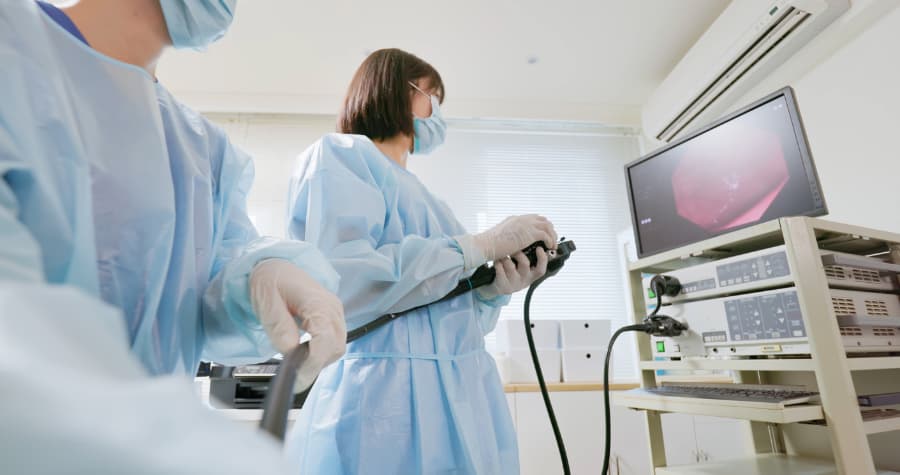In the United States, one of the most common types of cancer is colon cancer. Most patients receive their diagnosis after their first colonoscopy between ages 45 and 50. However, colon cancer can affect anyone, regardless of age. Colon cancer treatment is usually effective, but early detection is key.
At Richmond University Medical Center on Staten Island, our board-certified oncology team provides advanced treatment options and cutting-edge techniques to deliver personalized care. Here, we discuss the importance of regular colon cancer screenings.
Colon Cancer Screening Options on Staten Island
The most common form of colon cancer screening is a colonoscopy or a sigmoidoscopy. A gastroenterologist examines the large and small intestines using a flexible tube and camera, which helps to identify polyps, ulcerations, or lesions. Our team can perform these procedures in-house in one of our six state-of-the-art Gastroenterology and Endoscopy suites.
Colonoscopies are the “gold standard” of colon cancer screening because they offer an in-depth look at the entire colon. They can also be used with an at-home, non-invasive stool test. There are three common types of stool tests, including:
Guaiac-Based Fecal Occult Blood Test (gFOBT)
The gFOBT test uses the chemical guaiac to detect blood in your stool. Your physician provides you with an at-home test kit once a year. Simply use a stick or brush to obtain a small amount of stool. Then, return the test kit to your health care provider or a lab.
Fecal Immunochemical Test (FIT)
This test is similar to the gFOBT. You can do it once a year at home. The FIT test uses antibodies to detect minute amounts of blood in the stool.
FIT-DNA Test (Stool DNA Test)
With the Stool DNA test, you collect an entire bowel movement. The lab will check your stool for altered DNA and blood. You can have this test done once every three years.
If your medical provider notices anything unusual in your stool, they will perform a colonoscopy.
Benefits of Early Detection
On average, colon cancer affects 1 in 23 men and 1 in 25 women. It is the second leading cause of cancer-related deaths in the United States. It is known as a “silent killer” due to its lack of symptoms in its early stages. Most patients do not receive a diagnosis until it has progressed. This late-stage progression makes it difficult to treat.
With early detection, colon cancer is easy to treat and is often curable. Over the last several decades, the number of older adults dying from colon cancer has decreased. Screenings detect cancer-causing colorectal polyps before they mutate. They also detect cancers earlier.
Who Should Undergo Early Screening?
Even though the number of colon cancer-related deaths is declining in older people, it is increasing in younger people. In people under 55, deaths from colon cancer have increased by 1% a year since the mid-2000s. While the CDC recommends yearly colonoscopies for adults aged 45 and older, anyone of any age benefits from regular screenings. This is especially true in those who are at an above-average risk. Risk factors for colon cancer include:
- Inflammatory bowel disease, Crohn’s disease, or ulcerative colitis
- A family history of colon polyps or colon cancer
- Being overweight
- Physical inactivity
- Smoking
- Eating red and processed meats
- Drinking large amounts of alcohol
Certain inherited conditions, such as familial adenomatous polyposis (FAP) can also increase your chances of developing colon cancer. Having an honest discussion with your physician about your risks and lifestyle is essential.
Symptoms of Colon Cancer
Colon cancer forms from slow-growing polyps. These benign growths can mutate into malignant growths over time. In most cases, these polyps do not cause any symptoms. For those who do experience symptoms, the most common one is bowel changes. Changes include constipation, diarrhea, narrowing of stools, or blood in stools. Other colon cancer symptoms you could be missing are:
- Anemia
- Unexplained weight loss
- Vomiting
- Pain or bloating in the abdomen or pelvis
It is important to note that these signs could be related to other health issues. If you notice these changes, make an appointment with your primary care physician on Staten Island to receive an accurate diagnosis.
If your physician suspects you may have colon cancer, they will perform several tests, including blood tests, imaging tests, and a colonoscopy followed by a biopsy. These tests can help determine if you have cancer and how advanced it is. If cancer is detected, it is important to receive treatment right away.
Get Screened for Colon Cancer
When it comes to colon cancer, regular screening can save your life. If you are 45 or older, have a family history of colon cancer, or have one of the risk factors, talk to your physician. They can help schedule a cancer screening.
At Richmond University Medical Center in Staten Island, NY, our team of experienced oncologists can screen, diagnose, and treat colon cancer and other forms of cancer. For more information about colon cancer screening, contact us today or schedule an appointment.




